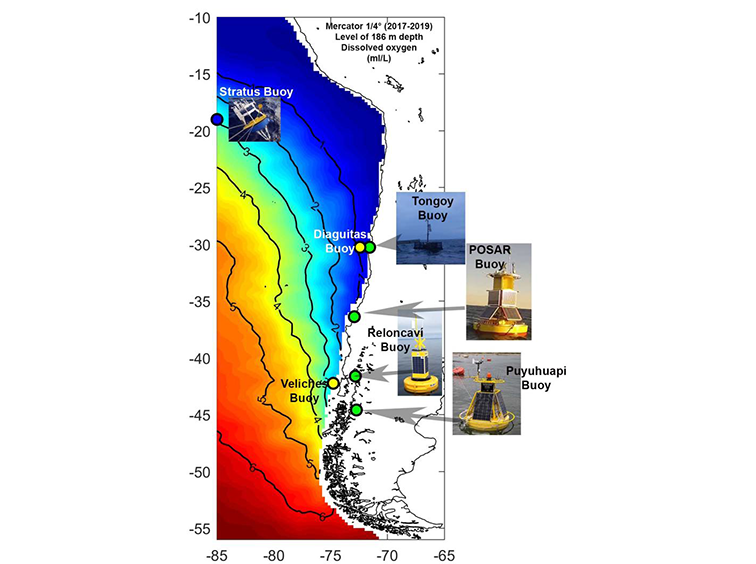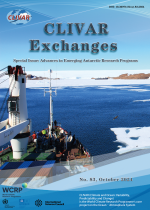CLIVAR Endorsed the Project: ‘Enhancing the Chilean Climate Ocean Observing System (ECCOOS)’

ECCOOS observing network (green and yellow dots): Existing buoys (green dots) will be complemented with pH sensors. The location of the STRATUS buoys is indicated by a blue dot.
The project entitled “Enhancing the Chilean Climate Ocean Observing System (ECCOOS)”, which is led by CEAZA (Center of Advanced Studies in Arid Zones) with the collaboration of other world-class Chilean institutions, has recently been endorsed by the CLIVAR SSG. The project has just been submitted to ANID (the National Agency for Research and Development in Chile).
The main objective of ECCOOS is to develop and maintain during 5 years a network of 6 surface buoys along the coast of Chile in order to enhance research capabilities in marine science in Chile in particular and in the South Eastern Pacific as a whole. ECCOOS will acquire 2 new surface buoys fully-equipped (currents, temperature, salinity, atmospheric parameters, pH, Oxygen) and deploy them off Coquimbo (30°S) and off Chiloe island (42°S), which will complement a network of 4 others existing buoys operating since 2014 and maintained by the partner institutions (University of Los Lagos, University of Concepcion, University of Chile, Universidad Catolica del Norte, CEAZA). The buoys will deliver data in real-time to the international community following international standards, that will serve for process studies, model validation and tuning, and for alerting on risks associated to extremes events (e.g. El Niño event, marine heat wave, hypoxia, storms, etc).
This endorsement comes with the support of the CLIVAR Pacific Region Panel (PRP), who is aware of the need to enhance observational capabilities along the coast of South America in order to better understand not only regional impacts of climate variability but also feedbacks of regional variability (air-sea interactions) onto the tropical Pacific climate system. The panel believes that ECCOOS is timely and in line with the current international efforts to enhance the observing system in the Pacific in the context of several programs (e.g. GOOS, TPOS2020, ARGO). The open data policy for marine and atmospheric data proposed by ECCOOS would allow improving reanalysis products in this region with potentially important positive effects on the skill of seasonal forecast systems. This would significantly benefit all countries of the eastern Pacific rim. The Panel also notes that ECCOOS could favor the development of research projects with other regional partners (e.g., Peru, Ecuador), a partnership that could be extremely valuable to provide an integrated view of the connection between the coast of South America and the equatorial region. PRP strongly encourages the pursuit of such collaborations with other countries along the South America coast. Meanwhile, the panel shows particular interests in the data assembly, quality control (QC), dissemination and formats of the ECCOOS, and would like to maintain close interaction with the PIs of the project, receive periodic updates on its progress, and be able to provide input.













